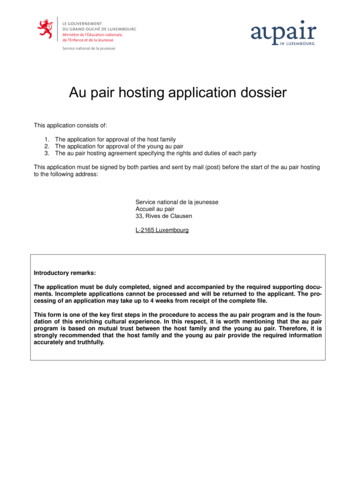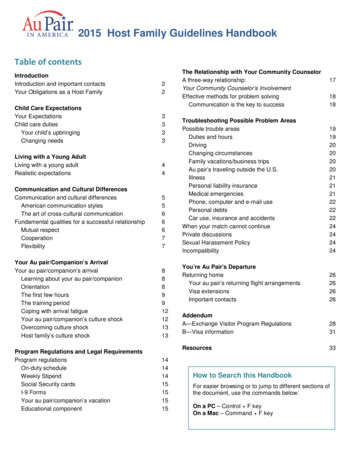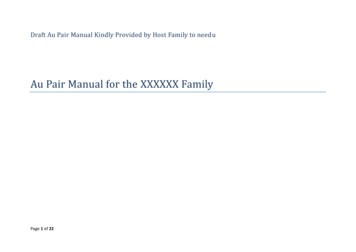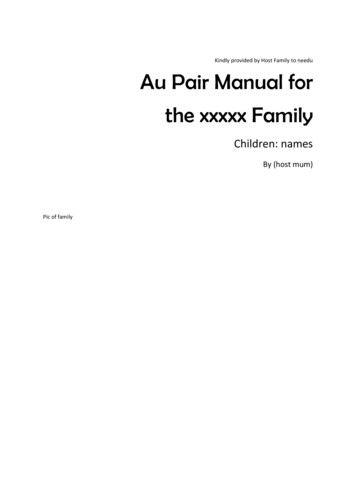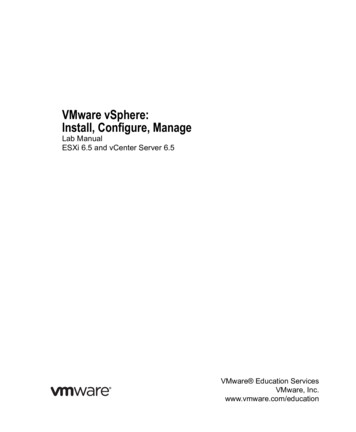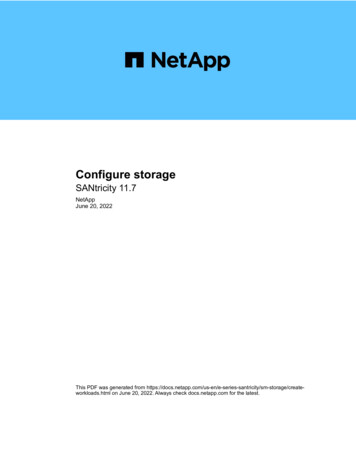
Transcription
HOST FAMILYhandbookCULTURALCARE.COM1-800-333-6056
2017 International Care, Ltd.
TABLE OF CONTENTSWELCOME TO CULTURAL CARE AU PAIR4YOUR CULTURAL CARE SUPPORT TEAM AND MATERIALS6Your Cultural Care support teamYour Cultural Care support materials79PROGRAM REGULATIONS12Childcare scheduleWeekly stipend paymentAu pair vacationsFamily vacationsEducation requirementHost family eventsAu pair monthly meetings13141415161616HOST FAMILY RESPONSIBILITIES18Treat your au pair as a family memberProvide support for your au pairInvest in cultural exchangeCommit to good communication practices20202020AU PAIR RESPONSIBILITIES22Education requirementAu pair monthly meetingsAdditional au pair responsibilities232323COMMUNICATING WITH YOUR AU PAIR24Cultural differencesWeekly meetingsCommunication best practicesThe first few daysSetting realistic expectationsTaking care of logistical detailsWhen issues arise25252528293133U.S. DEPARTMENT OF STATE REGULATIONS35 3
WELCOME TOCULTURAL CAREAU PAIRThank you for choosing Cultural Care Au Pair, and congratulationson selecting your family’s au pair! Welcoming an au pair into yourhome is an exciting time for everyone. Soon, they will essentiallybecome another extended family member. As is always the case whenincorporating someone new to the family, there will be an initialadjustment period. Further, your relationship will need nurturing andattention throughout the year. We’ve created this handbook to helpguide you every step of the way as you navigate the year together.We wish your family and your au pair a great year!4
ENJOYING A SUCCESSFUL YEAR WITH YOUR AU PAIR STARTSWITH THESE VERY IMPORTANT STEPS: Relying on your Cultural Care support team and materials for help Adhering to the program rules and U.S. Department of State regulations Recognizing your responsibilities as a host family Knowing what you can expect from your au pair Maintaining good communication throughout your yearThis handbook outlines each of these steps and shares helpful advice along theway, so you can enjoy the best year possible with your au pair. 5
YOUR CULTURALCARE SUPPORT TEAMAND MATERIALSAs a Cultural Care host family, you have a supportteam readily available to help at any time duringyour year. Cultural Care Au Pair also provides manysupport materials that will help you maintain goodcommunication during the year and be a resource forprogram information and best practices.6
YOUR CULTURAL CARE SUPPORT TEAMYour support team during the year includes your Local Childcare Consultant (LCC),Account Manager, and Program Director. Each has a different role in helping younavigate the year with your au pair.Your Local Childcare Consultant (LCC)Your LCC is your local program expert and go-to resource for information and advice.They will act as a liaison between you, your au pair, and the rest of your Cultural Careteam, in addition to providing support on a regular basis. You can expect your LCC to: Interview your family in your home before your au pair arrives Call to check in within 48 hours of your au pair’s arrival Conduct an initial orientation with your au pair and family within two weeks of yourau pair’s arrival Hold monthly meetings for your au pair Reach out to you on a monthly basis to check how things are going Provide advice on local educational opportunities Host au pair/family events twice per year—your attendance at one event is required Give support and advice as needed Help find a resolution should a conflict ariseWelcome call and orientationOne of the most sensitive times during your year is right after your au pair arrives. Forthis reason, your LCC will call to welcome your au pair shortly after she arrives, andwill arrange an orientation meeting with your family and au pair within your first twoweeks together. At the orientation meeting, your LCC will have an opportunity to meetyour au pair and make sure the first few days have gone well. Practical information willbe also discussed, including initial adjustment issues, if there are any.Monthly communicationYour LCC will continue to contact you once a month while you are hosting yourau pair. These are informal check-ins to provide advice, program updates, and anopportunity to ask any questions you may have. These contacts are a Department ofState regulation, as well as a proven way for Cultural Care to help support you and yourau pair, and we ask that you be responsive to your LCC’s outreach.Cultural Care tip: CONNECT WITH YOUR LCCIt’s important to take the time to talk with your LCC every month. Not only is it a Department ofState regulation, the better your LCC gets to know you, the more they can help your family have asuccessful year.YOUR CULTURAL CARE SUPPORT TEAM AND MATERIALS 7
Host family advice“Take a close look at all the information Cultural Careprovides you and try to connect with other families who havegone through the process for some best practices. Be patient. Thebeginning can be challenging, so the more patient you can be thebetter. Treat your au pair as you’d want someone to treat yourdaughter or son if they were to living in another country. Be kindand considerate to them. Treat them as you would family—thatmeans worrying about their safety, setting boundaries and beingconsistent and firm with them. Let them know you appreciatethem, as they are young and often need positive reinforcement.”Trish, Cultural Care host mom in Massachusetts8
Your Account ManagerYour Account Manager is ready to answer all program-related questions during youryear, big or small. Contact your Account Manager for information related to: Finances Your Host Family Account U.S. State Department regulations Travel with your au pair Au pair insurance General help and supportYou can reach an Account Manager at 1-800-333-6056, Monday through Friday from8:00am to 7:30pm EST, and Saturday from 9:00am to 3:00pm EST.Your Program DirectorYour Program Director acts as an additional layer of support during the year. If yourLCC or your Account Manager is unable to answer your questions or if you and yourau pair are experiencing difficulties, your Program Director may step in to assist.YOUR CULTURAL CARE SUPPORT MATERIALSIn addition to your support team, Cultural Care Au Pair provides a number of onlineand printed resources for you to use during the year. These tools are designedto help answer your questions and foster good communication with your au pairduring the year.Host Family AccountYou will find a wealth of great program information in your online Host FamilyAccount. Click the pink “HELP” button to access a searchable directory of usefulinformation and tips as well as important forms and documents.Cultural Care tip: YOUR HOST FAMILY ACCOUNTYour Host Family Account is your go-to reference for information regarding au pair taxes,au pair insurance, au pair travel, and much more.To login, visit: culturalcare.com/login.YOUR CULTURAL CARE SUPPORT TEAM AND MATERIALS 9
Daily Communication JournalThe Daily Communication Journal is a tool for you to use with your au pair in orderto keep track of the daily/weekly/monthly schedule, log an au pair’s on and off-dutytime and write down important appointments and to track and confirm weekly stipendpayments. We also suggest using the journal to give detailed instructions for activitiesto do with the children and the child-related household help you expect.Household HandbookOur customizable Household Handbook is available for download from your HostFamily Account and will help you outline the household rules you expect your aupair to follow while living with your family. This handbook encourages you to clarifyhousehold rules regarding: Childcare and household responsibilities Visitors and guests Curfews Car use Television Phone Internet and computer use Use of appliances?For sample Household Handbooks completed by experienced host families and tipson determining your own household rules, visit “HELP” in your Host Family Account.We recommend customizing your handbook before your au pair arrives and printingand reviewing it with her soon after she joins your family.Cultural Care tip: CURFEWEven though you probably discussed this in your interview, curfew is an important issue to bringup as soon as your au pair arrives. Most families give their au pairs a curfew based on when and ifshe will be on-duty the next day. An earlier curfew on weeknights is reasonable and ensures yourau pair has time to get enough rest so she can fulfill her duties. On weekends, au pairs generallyexpect to be out later. Some families have a car curfew meaning that the car must be back by acertain time, but the au pair may stay out later.10 YOUR CULTURAL CARE SUPPORT TEAM AND MATERIALS
Host family advice“Having a handbook for house rules is a great tool to use. Itlets the au pair read and re-read the children’s schedule andwhat’s expected of them. I never would have thought to even talkto my au pair about things like how to run the dishwasher andour policy on car use and overnight guests. But the HouseholdHandbook helped us put together a thorough list ofall of the things our au pair needed to know.Kari, Cultural Care host mom in Oregon 11
USDOSPROGRAMREGULATIONSAll host families and au pairs are expected tofollow program regulations as dictated by the U.S.Department of State and Cultural Care Au Pair. Theserules are in place to protect the interests of both au pairsand host families, and to ensure we can continue to offerthis unique opportunity for families and young peoplefrom around the world for many years to come.12
PROGRAM REGULATIONSAll designated au pair organizations follow specific regulations issued by the U.S.Department of State (a copy of these regulations is included at the end of this handbook).The U.S. Department of State and Cultural Care Au Pair require host families to: Limit the number of hours au pairs provide childcare to 45 per week and no morethan 10 hours per day Provide stipend payment to au pairs each week Provide two weeks of paid vacation each year Contribute up to 5001 towards their au pair’s education requirement Attend an orientation meeting and at least one family day conference during the year Ensure their au pairs have 1.5 consecutive days off each week and at least one fullweekend off each monthCHILDCARE SCHEDULEAccording to the U.S. Department of State regulations, your au pair is allowed to provide nomore than 45 hours of childcare per week, with a maximum of 10 hours in any one day. This 45-hour limit includes the direct care of your children and all childcare-relatedtasks (i.e. laundry and room tidying). The children’s sleeping time is counted as onduty time if your au pair is alone with the children. Your au pair must have at least 1.5 consecutive days off each week. This means thatyour au pair should be off-duty from mid-day through the full next day, or vice versa. A half-day should not exceed 5 hours on-duty for your au pair. Au pairs are also entitled to one full weekend (Friday night to Monday morning) offper month.Your LCC will confirm each month that these regulations are being followed with bothyou and your au pair. As far as holidays go, it is your responsibility to initiate a discussionto mutually determine which holidays your au pair will be on and off-duty as there are nodesignated holidays.The contribution towards an au pair’s education requirement is determined by the U.S. Department of State, and familiesagree to comply with any increase that is issued.1Cultural Care tip: ON-DUTY VS. OFF-DUTYBecause your au pair lives with you, it may be difficult for her to feel officially “off-duty”. It isimportant for your au pair to know that you are sensitive to this dynamic and recognize when herofficial duties are over. Keep in mind that any time you would expect your au pair to take overresponsibility for the children, whether or not you’re present, is considered part of her 45-hour limit.U.S. DEPARTMENT OF STATE REGULATIONS 13
WEEKLY STIPEND PAYMENTThe weekly stipend you give your au pair is a living stipend of 195.75, which iscalculated with a formula using the federal minimum wage and a housing credit.Any change in the federal minimum wage will result in an increase in the stipend. Allresulting changes must be adhered to by all program participants, regardless if such achange occurs during an existing program year.You must pay your au pair her stipend on a regular weekly schedule. Au pairs may notbe payed bi-weekly or monthly. We also ask you to document this transaction using yourCultural Care Daily Communication Journal or some other receipt system. You cannotwithhold your au pair’s stipend for any reason, including a car accident, outstandingtelephone bill, lost time due to illness or other damages, nor can the stipend be pro-ratedfor any reason. Your LCC will confirm with both you and your au pair each month thather weekly stipend is being paid.AU PAIR VACATIONSAccording to U.S. Department of State regulations, your au pair is entitled to two weeks (14days) of paid vacation during the year. While granting single vacation days might suit yourfamily, we suggest that au pairs take vacation one week at a time so they can travel withinthe U.S. and take a meaningful break from their duties. (The two weeks of vacation do nothave to be taken consecutively.) If at any time you welcome a new au pair during the year,you will be responsible for accommodating the remaining vacation time, including payingthe weekly stipend that your new au pair is due for that time.Although it is up to you and your au pair to plan vacation time, Cultural Care Au Pairsuggests au pairs take the first week of vacation within the first 6 months and thentake the second week during the remaining 6 months. Vacations should always bemutually convenient, and it is never too early to begin discussing potential vacationdates for your au pair.Cultural Care tip: HOLIDAYSWith regards to international holidays and religious observances, there are no designated holidaysfor your au pair. That being said, it is best to let her know about holidays on which you expectyour au pair to be providing childcare in advance. Will you need her to care for the kids whileyou prepare Thanksgiving dinner for your extended family? Will she be expected to be on-dutyfor Memorial Day, even though it’s a widely recognized American holiday? Make your holidaychildcare coverage needs clear so that you both know what to expect.14 U.S. DEPARTMENT OF STATE REGULATIONS
FAMILY VACATIONSSome families love to take their au pairs on vacations with them; others want privatetime to themselves. Whether or not you invite your au pair to accompany you whileyou travel is your choice. However, if you require your au pair to accompany you ona family vacation and she will be considered on-duty, you are expected to provide herwith her own room and pay for all expenses, in addition to the weekly stipend. If sheis on-duty, this time cannot count towards your au pair’s vacation time.If you invite your au pair to join your family on vacation as part of her vacation time(meaning she will not be responsible for providing childcare), your au pair can be askedto pay her own expenses. We encourage you to make this very clear from the beginningand give your au pair an idea of how much money she will need for the trip. If yourau pair declines your invitation please try not to feel offended. Most au pairs have alimited budget and prefer to spend their two weeks of vacation with friends.?You will find a copy of the U.S. Department of State regulations on page 35 ofthis handbook.Cultural Care tip: AU PAIR TRAVELWhen au pairs travel outside of the U.S. during their au pair year, there are strict guidelines theymust follow in order to ensure they can re-enter the country. Make sure you visit “HELP” in yourHost Family Account or call 1-800-333-6056 for more information.U.S. DEPARTMENT OF STATE REGULATIONS 15
EDUCATION REQUIREMENTThe U.S. Department of State requires all au pairs to fulfill an education requirement of6 semester hours (or their equivalent of academic credit) in a formal classroom setting atan accredited, post-secondary institution while they are in the U.S. As a host family, youare responsible for paying up to 500 for enrollment and related educational expenses.Should you transition to a different au pair during the year and your first au pair hasalready used 500 for courses, you are still responsible for paying the balance needed—up to 500—in educational expenses for your new au pair. You are also responsible forproviding transportation to and from classes or covering transportation costs if your aupair drives herself or takes public transportation.HOST FAMILY EVENTSYour LCC will organize at least two host family events during your program year, andthe U.S. Department of State guidelines require host families to attend at least oneof them. These are usually casual, fun occasions that give families a chance to meetother host parents and au pairs and spend some time with their LCC.AU PAIR MONTHLY MEETINGSAu pairs are required to attend monthly meetings in their community, hosted bytheir LCC so that they can connect and form friendships with other au pairs as wellas speak with their LCCs face-to-face. It is your responsibility to ensure your au pairattends these meetings by driving her, allowing her to drive herself or paying for herto travel by public transportation.Cultural Care tip: AU PAIR CLASSESWe suggest you help your au pair look into classes at nearby schools soon after she arrives,because it can take time to find a class that is offered at an accredited institution and meets at aconvenient time. Au pairs who want to extend their year must show proof that they have completedtheir education requirement by the end of their 11th month in the U.S., so waiting too long canmean losing the opportunity to extend their stay.16 U.S. DEPARTMENT OF STATE REGULATIONS
Host family advice“Communicate your needs to your au pair! If the expectationsare clear, then the chance of disappointment or a bad matchis significantly less. Remember that your au pair is someone’schild—treat them with the same love, compassion and respectyou would want someone to give your own child embarking onsuch a huge adventure outside their own home country.”Carrie, Cultural Care host mom in Maryland 17
HOST FAMILYRESPONSIBILITIESIn addition to following the regulations dictated bythe U.S. Department of State, host families also havea responsibility to embrace the “spirit” of the au pairprogram. We expect our host families to honor thetrue meaning of the program by welcoming their aupair as a family member, supporting her during theyear, investing in cultural exchange and committingto good communication practices.18
Host family advice“You are welcoming a young person into your home—the moreyou give, the more you’ll get! The more transparent and open youare with your expectations and needs and the more you care abouttheirs, the better the relationship will be. They need support anda warm welcome. If you take the time to make their early monthswith you warm, full of fun, and show an eagerness to teach themabout your culture and language, they’ll start to find friendsand need less support from you. The appreciation for yourearly efforts will appear in wonderful ways.”Ellen, Cultural Care host mom in Massachusetts 19
TREAT YOUR AU PAIR AS A FAMILY MEMBERWhen you decide to host an au pair, you are not hiring an employee, but ratherdeciding to invite a new member into your family. As such, “give and take” willnaturally be a part of the program. Asking how your au pair’s day was, being thoughtfulon holidays and her birthday, and including her in your family meals and excursionswill go a long way toward making her feel welcome. Think about how you would wantsomeone to treat your child if they were living with a host family abroad, and treat yourau pair accordingly. Your au pair may not always join you for every activity—and that’sokay. Knowing you care enough to offer her the opportunities is what’s most important.PROVIDE SUPPORT FOR YOUR AU PAIRThere will be days when your au pair feels homesick or needs reassurance whileadjusting to immersion in a new language and culture, especially in the beginning.While your Local Childcare Consultant (LCC) and Cultural Care staff can step in tohelp, you are the first line of support for your au pair. Taking the time to listen to herand offer encouragement is part of being a great host family. It’s also important to beadaptable, and allow your au pair to make mistakes and grow.INVEST IN CULTURAL EXCHANGECaring for your children is your au pair’s priority, but it is also important for her toenjoy the benefits of an exchange experience. Experiencing life in the U.S. is one ofthe biggest reasons au pairs apply to the program, and they look to you for ways tolearn about American culture. For this reason, you should be prepared to: Help her adjust to a new language and culture Encourage her to seek new experiences Include her in your own American traditions and holidays Invite her to share her customs and traditions with your familyCOMMIT TO GOOD COMMUNICATION PRACTICESOne of the most important things to remember during your year is that communicationis key. The more you communicate with your au pair, the more successful your year willbe. Ways we expect our host families to communicate include: Communicate the weekly schedule in detail and as far in advance as possible Hold weekly “touch base” meetings with your au pair Let your au pair know when you are happy or unhappy with something Recognize that your au pair may be nervous to express her own concerns, especiallyin the beginning—if you sense something is wrong, encourage her to speak up Talk with your LCC about problems that can’t be resolved20 HOST FAMILY RESPONSIBILITIES
Host family advice“We include Sophie in our holidays and we celebrate themtogether. We all went trick-or-treating as a family for Halloweenin a group costume and had an absolute blast. Introducing Sophieto Thanksgiving was fun, and we’re looking forward tocelebrating Christmas as well. Sophie is already in the spiritand helped us decorate with the kids!”Tabby, Cultural Care host mom in Maryland 21
AU PAIRRESPONSIBILITIESAu pairs also have responsibilities to fulfill duringtheir program year. Some of these responsibilitiesare dictated by the U.S. Department of State,and some are implied by the “spirit” of the program.Au pairs are informed of these responsibilitiesduring the screening process in their homecountries and also at the Au Pair Training School,but it’s also helpful for you to familiarize yourselfwith this information, so you know what youcan expect from your au pair.22
EDUCATION REQUIREMENTTo remain in “good standing”, the U.S. Department of State requires all au pairs to fulfillan education requirement of six semester hours (or their equivalent of academic credit)in a formal classroom setting at an accredited, post-secondary institution while they arein the U.S.AU PAIR MONTHLY MEETINGSYour LCC is responsible for organizing monthly meetings for the au pairs in your area inan effort to introduce them to American culture, familiarize them with their community,and help them to make friends. Monthly meetings are mandatory for au pairs andthose who miss more than two meetings are no longer considered in good standing.Attendance is documented by your LCC, and attendance reports are sent to the CulturalCare office.ADDITIONAL AU PAIR RESPONSIBILITIESIn addition to following all of the U.S. State Department regulations, Cultural Care AuPair expects our au pairs to adhere to the “spirit” of the program by: Being goodwill ambassadors of their countries Being flexible, adaptable, reliable and positive Trying their best at all times Accepting and showing respect for their host families and their cultures Participating in host family and community activities Being open and honest with their host families about problems Talking with their Local Childcare Consultants (LCCs) about any problems that cannotbe resolved with their host familiesCultural Care tip: PREPARE EARLY TO EXTENDAu pairs must have completed their education requirement by their 11th month and attended aupair monthly meetings to be able to extend their year. If you anticipate that your au pair will want toextend for an additional 6, 9 or 12 months, it’s a good idea to encourage her to take her classes andau pair meetings seriously.AU PAIR RESPONSIBILITIES 23
COMMUNICATINGWITH YOUR AU PAIRThe most important thing you can do as ahost family to ensure a great year with yourau pair is to communicate. Because your au paircomes from a different country and English maynot be her native language, communication is evenmore important. Recognizing cultural differences,setting up regular times to talk, and using effectivecommunication skills are all essential to a greatexperience for you and your au pair.24
CULTURAL DIFFERENCESAs a host family, it’s important to remember that cultural differences are natural andshould be respected. Something that may seem silly or strange to you might be customaryin your au pair’s home country. Before casting judgment, it’s critical to try to understandwhy your au pair may behave in ways that are different from what you might expect.Once your au pair arrives, we suggest having an open discussion and askingquestions about each other’s countries and cultures. Use this as an opportunity toget to know each other. Seeing the humor and delighting in our differences makes usseem all the more similar.?To learn more about culture shock and how to help your au pair overcome it,visit “HELP” in your Host Family Account.WEEKLY MEETINGSWe recommend you set aside a specific time each week to discuss your au pair’s scheduleand responsibilities and any issues that come up during the week. Informal meetingsseem to work best to discuss all issues that come up during that week—parents’ workschedules, children’s activities, conflicts, successes, etc. In addition to your weeklymeetings, have as many spontaneous discussions as needed to keep things runningsmoothly. If you want your au pair to change the way she is performing a particular task,or if you would like to add a new responsibility, be sure to let her know directly. Do notignore problems—if they are not addressed, they will only get worse. Give your au pairthe opportunity to do better because she wants to succeed as much as you do.COMMUNICATION BEST PRACTICESWhen speaking to your au pair about her duties or when giving feedback, we suggestfollowing some ground rules of good communication. Two of the most effective toolsyou can use to facilitate good communication with your au pair are assertive directingand effective listening.Assertive directingAssertive directing means being open and straightforward about your expectations,family routines, childcare practices, au pair responsibilities, work schedule,household rules, etc. To practice assertive directing, sit down to discussresponsibilities, household rules, work schedule and other relevant items after givingyour au pair a few days to settle in. Be direct about your expectations. Openly discuss your childcare philosophy, types of activities you want your au pairCOMMUNICATING WITH YOUR AU PAIR 25
to do with your children, household rules that apply to the children, issues aroundfood/snacks, desired discipline techniques, etc. Use the Household Handbook to outline her childcare and householdresponsibilities in full since it is helpful for au pairs to refer to written directions. Explain things carefully and thoroughly—not all at once, but probably more than once.Effective listeningEffective listening means listening to your au pair with the intent to understand herfeelings and needs from her perspective, not your own. Most often we listen not withthe intent to understand, but rather with the intent to respond. We are either busypreparing to speak or we are already talking over the other person. If you want tointeract effectively with anyone—your au pair, spouse, child, co-worker, supervisor,neighbor, friend—you must first understand him or her. The two main componentsof effective listening are empathic listening and using reflective feeling statements.Empathic listeningThis level of communication occurs when we are willing to walk in our au pair’s shoesand see the world from her perspective, rather than react with our own emotions,judgments, stories, suggestions, etc. This is crucial when we are dealing with culturaland language differences, and it accomplishes three primary things: Reduces emotion to a more manageable level Allows parties to get to and through the problem solving process Builds a relationship based on trust, credibility, and integrityWhen you have a discussion with your au pair, it’s also important to pay attention tothe feeling tone of what is being said. Sometimes your au pair might have difficultyvocalizing her true feelings, but if you listen to the tone of voice and take note offacial expressions and body language, you may pick up on those emotions. Anotherhelpful tip for establishing good communication is to review your au pair’s DISCpersonality profile accessible through your Host Family Account. This profilewill also help you see a situation from her perspective and give insight as to whatcommunication style she will respond to best.Using reflective feeling statementsIt is a good idea to use statements to reflect back to your au pair what you thinkshe is feeling before you offer any assistance. By accurately reflecting your au pair’sfeelings, you assist in diffusing emotions so she can open up to new possibilities. Onlyafter you both understand the issue at hand is it appropriate to o
WELCOME TO CULTURAL CARE AU PAIR 4 YOUR CULTURAL CARE SUPPORT TEAM AND MATERIALS 6 Your Cultural Care support team 7 Your Cultural Care support materials 9 . We recommend customizing your handbook before your au pair arrives and printing and reviewing it with her soon after she joins your family. Cultural Care tip: CURFEW
